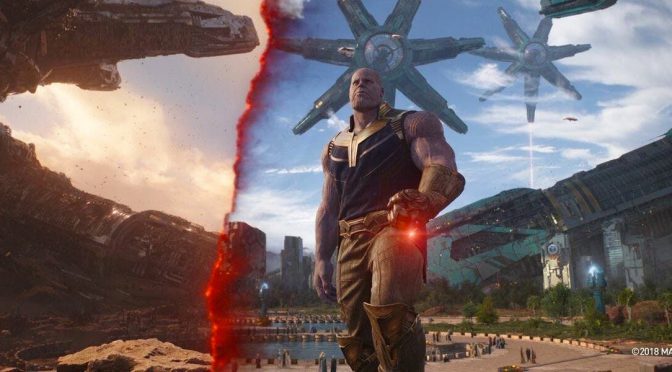There’s a saying that has always stuck with me over the years: “everyone sees themselves as the hero of their own story.” And it’s true, no one does an action thinking they are the absolute villain. They had reasons, they felt motivations, they were doing what they thought was right. Yes, they may later regret their actions, but in the moment of doing them they felt correct even if everyone in the world may think otherwise. No one commits crime because they want to be the bad guy – either they’ve convinced themselves that they are in the right or they have a mental condition that detaches them from a sense of right and wrong. Even the greatest monsters in human history were convinced of the righteousness of their own cause, no matter how abhorrent their actions seemed to the rest of the world.
So then applying that sort of thinking to your fictional characters can make your villains feel all the more real. If you make it so that you can see where the villain is coming from, it feels more natural to us by default because we can understand, on some level, why they would act that way. Do we have to agree with their actions? Not at all. But if we can understand why the villain thinks they’re right then we can at the very least feel like that villain was realistic, even if their methods and actions are far outside of the realms of reality. For instance, while none of us would have the opportunity to assemble a gauntlet of god-like power, a lot of us could understand the motivations for wanting to do so.
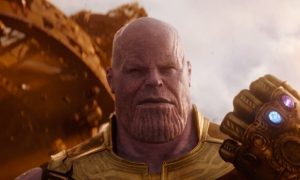
But one of the problems with writing villains in those grey areas is that sometimes people mistake moral objection with a plot hole. We all do it on some level, seeing mistakes made by characters – whether they be due to a lack of planning or lack of moral fiber – as a mistake by the creators and not simply a failure of the character. Sometimes, this results in people demanding answers to questions that were actually answered within the material. And our balancer of the universe, Thanos, is no exception to this. Faced with the uncomfortable ramifications of Thanos’ ruthless “solution” to a problem he saw as a threat to the universe, a lot of people online cried foul and some even said it was a failing of the movie. Then, in almost every case where someone pointed at this “failing”, they inevitably recommended a solution of their own – almost always the same solution.
Ironically, the solution those critics recommended kind of prove that Thanos’ mistake wasn’t a plot hole. Because, when you step back to actually consider it, the solution everyone recommended would actually kill more people than Thanos did…
In A Snap
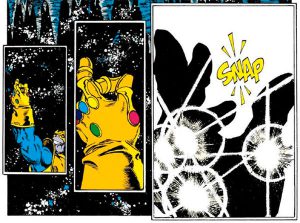
For those who haven’t had an opportunity to watch Infinity War and somehow managed to avoid the internet’s memes around Thanos’ solution, I warn you that there will be spoilers ahead. I’m not particularly apologetic about it, because it has been a while and it has been a huge hit. But if you want to take a moment to watch it before you read this, this is your last opportunity.
Done? Good.
So the MCU’s version of Thanos, having witnessed the dangers of scarcity and the threat of overpopulation, has decided to use the Infinity Gauntlet to cut the population of the universe in half with a snap of his fingers. Within the next few moments across the universe, in a scene that left a lot of people fairly broken and set sail a thousand memes, beloved characters simply turned to dust and blew away on the wind as half of the population of the universe ceased to exist in an instant. It was devastating, it was ruthless, and it left a lot of people fairly uncomfortable (after all, he is the villain). But in the days following it first being witnessed, a lot of people started to say that this was a plot hole because there was an obvious solution that Thanos had missed: if you wanted to prevent countless deaths due to scarcity of resources, why not just double the resources?
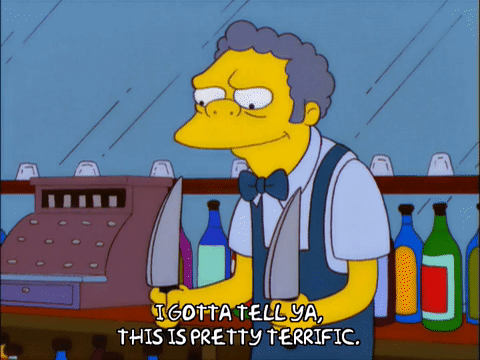
On the surface, this feels like the more humane solution and, if Thanos is legitimately concerned with preventing suffering as he claims, it feels like the more genuine conclusion. As such, most people who brought it up saw it falling under one of three possibilities. One possibility was that Thanos was unwilling to think things through, for whatever reason, and was too caught up in his own vision. Others presumed that Thanos was actually lying about his motivations and had other motivations which were to be left for the next movie or were simply left on the cutting room floor. But the third possible solution, the one that caused me to start writing this in the first place, was that it was simply a plot hole – Thanos didn’t think of the solution because it served the plot to have him ignore it.
The creators themselves have actually stated that this wasn’t the case and that it was actually the first possibility – Thanos was obsessed with the need to prove his methods wold work. So we could probably end the whole conversation right there. If they thought of it, and they avoided it because Thanos had motives, it’s not a plot hole even if you don’t agree with it. Just because we don’t like someone’s methods doesn’t mean that the story is flawed. He’s the villain, after all, and we’re supposed to disagree with him. But I propose that we could go further on this: if Thanos, an immortal, had enough time to think about it, the solution everyone would think was obvious could actually be ruled out for the fact it would cause more suffering in the long run. Though Thanos’ perception of the problem is a bit askew (more on that later), the two solutions presented remind me of an old ethics question, one that most of us have seen before.
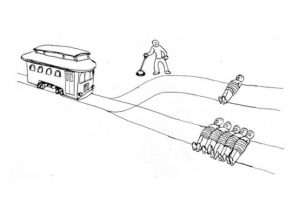
One of the options, the one with more people on the track, causes the most actual carnage but can be said to be something we had no direct role in. For some people, that lack of direct action makes it possible for them to feel better about the result, even if more people died in the long run. For others, killing the one person to save several is a nobler act, even if you had to personally condemn that person. Neither one of these answers is absolutely “right” or “wrong”, but it does say something about how you view the world. And, while it feels completely detached from the conversation, I think by the end you might see why it comes to mind for me today.
The idea that doubling the resources could be destructive feels counter-intuitive, but that’s because the problem itself is a little counter-intuitive. We so often worry about surpassing the natural resources made available to us that we tend to forget just how population growth actually works. Despite our fears, populations don’t grow in spite of resource availability but because of it – at least, on the short term. A simple look at the history of human population will show that we tend to explode in population when new resources become available. Prior to the industrial revolution, all of human history had our population throttled to less than a billion people. Yet, in the 250 years since, that population has exploded to 7.5 billion, with most of that happening in the last century alone. It’s not simply coincidence: when it becomes easier to live, we live longer and we continue to multiply. Though there is some degree of plateau seen in many countries today, we aren’t quite sure just how high the number would get before we finally hit that point – and we’re only one planet.
Extrapolated to the rest of the universe and to other species, and there could be population explosions that make ours look kind of sad in comparison. By increasing the availability of resources with a simple snap of the finger, Thanos could actually cause the population to double or even triple before it finally hits the new cap that Thanos has set. And, if he were to be serious about wanting to prevent suffering, he would then have to double the resources again (if the Gauntlet can still keep up), resulting in a doubling of the doubling. In every instance, more lives would be on the line, and those lives would take up increasingly more space – a situation that can lead to greater hostility and even outright war. Imagine the chaos of trying to fit 20 or 30 billion people on Earth alone and try to picture what that would look like stretched across countless other worlds. But then, that wouldn’t happen, because there’s a good chance that some other resources would actually kill us before we got there.
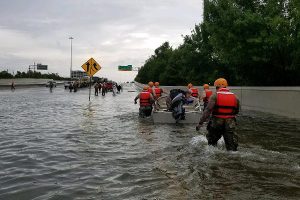
We often forget in the first world that some resources we take for granted are still resources that have to be worried about for the rest of the world. I live in California and have seen some fairly dramatic droughts myself, but even in my case it wasn’t as bad as some other parts of the world. As climate change becomes a greater concern, military advisers have kept an eye on the potentials of water wars. So it goes so far as to say that one of the precious resources that Thanos would have to double would be the water supply. But what would happen if we were to double the water available? Floods would replace droughts, shorelines would be inundated with higher seas, and most of it would be lost to us as flooded rivers drained out to sea.

Similarly, some resources that are incredibly vital to how our society operates today would actually result in even worse ecological disasters. Fossil fuels, for instance, are currently held as the cheapest method of powering our civilization. Though the prices of that fuel may rise from time to time as fears of “peak oil” begin to appear, those fears and those prices eventually crash every time new reservoirs are discovered. For those of us worried about climate change, the fact remains that getting the world to adopt alternatives to fossil fuels is harder when those fuels are cheaper. The fact is, with a snap of the fingers, Thanos could double that supply and crash the value of oil to a point that no alternative will be able to compete. And, while this would make it very easy for people to use coal, gas, and the like – it’s an unfortunate fact that we’ve been slow to change our ways even in the face of possible ecological catastrophe. Now, imagine that we had no economic pressures to change and ask yourself how far we might push climate change before we finally stopped.
The truth is, the proposed alternatives to Thanos’ methods actually prove him to be a well developed villain rather than the source of a plot hole. Though his approach is more ruthless and brutal than many of our approaches would be (thus making him the villain), many solutions that we in the audience would propose would be just as bad even if we felt better about them. Faced with the same problem and given the same resources, many of us would feel righteous in our attempt to preserve life with the power of the Gauntlet. Yet, in the process of doing that we would end up making the very same mistake he does… using the Gauntlet in the first place.

You see, the problem with using the Gauntlet is that any attempt to fix the universe’s problems with a single snap, regardless of how good our intentions might be, will always come with reprecussions. You can’t just cut the population in half and call it a day – besides causing horrible loss and tragedy, that population will someday recover and need to be culled again (and some resources will never come back). You can’t just double the resources either, because that would cause intense chaos one way or another. You could theoretically cut people’s needs in half by making them less reliant on food and water, but then you’ve fundamentally changed everyone on a biological level (something Serenity tried to warn us about years prior).

Thanos is the villain because the solution he came to is brutal (and probably even unnecessary), but he didn’t come to that solution because he was written poorly. We all have a tendency to look for magic bullets that will solve all of our problems. We all have a desire to be able to make a wish that would end someone’s suffering. But in the end, problems that face entire populations aren’t solved by a single snap of the fingers, they’re solved by a great many changes on societal, technological, and philosophical levels. And, no matter how good our intentions may be, any attempt to resolve those sorts of problems with a single action will inevitably lead to suffering. The question is: how much suffering are we willing to cause and how much of it are we willing to directly witness? For most of us, causing suffering that we can’t see might be preferable. For Thanos, limiting the overall suffering in favor of a kind of suffering he would directly witness was preferable. For others…
Well, let’s just hope that kid never gathers the stones.
(I write novels and dabble in screenplays. Someday, I hope one of my villains makes someone uncomfortable too. When it happens, be sure to see me revel in it on twitter.)


